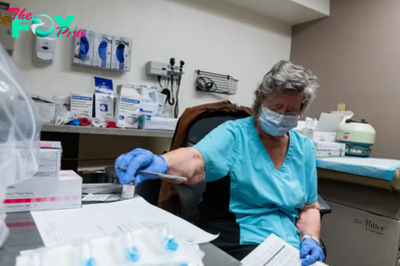Health
Syphilis cases in Colorado are exploding. The state just issued a public health order to try to stop that.
Syphilis is among the most brutal diseases known to humans, but it is also among the sneakiest.
Dr. Michelle Barron, an infectious disease expert with UCHealth, calls it “the great masquerader.” Early symptoms in adults are often painless, temporary and easy to miss. After that, the disease can lie silent in the body for years until it makes itself known.
And Colorado, like other states across the country, is now dealing with the devastating impacts that can occur when syphilis goes undetected and untreated.
Since 2018, syphilis cases in the state have more than tripled, to 3,266 last year from 1,084 in 2018. Those 2018 numbers were already a significant jump from previous years.
What is especially brutal is that syphilis, a bacterial disease primarily transmitted through sex, can be spread in utero from moms to babies. Colorado saw 50 such cases of congenital syphilis last year, up from seven in 2018. There have been 25 congenital cases reported this year, putting the state on track to potentially reach 100 cases before year end.
“This is easily treated,” Gov. Jared Polis said at a news conference Thursday, “but it can be very harmful and deadly for babies.”
Of the 25 cases of congenital syphilis so far this year, five resulted in stillbirths or miscarriages and two ended in death shortly after birth.
☀️ READ MORE
Western Colorado psychiatric hospital has “less than 30 days’ cash on hand” before it must close, leaders say
Colorado locked up middle-aged women for “lunacy,” old jail ledger reveals
Colorado doctors take on dental duties to reach low-income and uninsured patients
To combat this rise in syphilis cases among infants, the state Health Department on Thursday issued a public Health order requiring medical providers to step up testing for syphilis infections in people who are pregnant.
State law already requires that licensed medical professionals test for syphilis during the first trimester of pregnancy. The public health order expands that to require testing be offered also during the third trimester and at the time of delivery. It must also be offered when there is a fetal death after 20 weeks of gestation.
“Pregnant people have to be offered the test, they do not have to take it,” Jill Hunsaker Ryan, the executive director of the Colorado Department of Public Health and Environment, said Thursday.
The public health order goes into effect April 25.
The stages of syphilis
Syphilis is a multistage disease that most often first appears in adults as a painless sore in the location where the infection first entered the body. That heals, though, and then the disease lies dormant for a few weeks until a fever or rash appears. The immune system can also beat that back, leading to what is known as latent syphilis.
Some people can then have a third phase, when the disease roars back in attacks that can affect eyesight, hearing, muscle movement and cognitive ability.
Syphilis is treated through common antibiotics.
“The good news here is that syphilis is curable and treatment will save lives,” Dr. Rachel Herlihy, the state epidemiologist, said.

The state’s public health efforts focus especially on populations currently with higher rates of disease — those who are homeless, who are incarcerated or who use injection drugs. The public health order requires syphilis testing be performed at correctional facilities and also when a patient who is pregnant shows up at an urgent care or emergency room during the first or third trimesters.
The state has also expanded a pilot program originally started in Pueblo County that provided expanded testing to people incarcerated at the county jail. Sheriff David Lucero said the program has screened 634 people for syphilis, with 182 — more than a quarter — testing positive. Of those, seven were pregnant.
“Without a doubt, this program saves lives,” he said.
Focus on testing
Herlihy said the reasons that syphilis is increasing, both in Colorado and nationwide, are unclear. It is also not entirely certain why there are higher rates of syphilis in incarcerated or homeless populations.
-

 Health19h ago
Health19h agoThe Surprising Benefits of Talking Out Loud to Yourself
-

 Health21h ago
Health21h agoDoctor’s bills often come with sticker shock for patients − but health insurance could be reinvented to provide costs upfront
-

 Health1d ago
Health1d agoWhat an HPV Diagnosis Really Means
-

 Health1d ago
Health1d agoThere’s an E. Coli Outbreak in Organic Carrots
-

 Health2d ago
Health2d agoCOVID-19’s Surprising Effect on Cancer
-

 Health3d ago
Health3d agoWhat to Know About How Lupus Affects Weight
-

 Health6d ago
Health6d agoPeople Aren’t Sure About Having Kids. She Helps Them Decide
-

 Health6d ago
Health6d agoFYI: People Don’t Like When You Abbreviate Texts



























